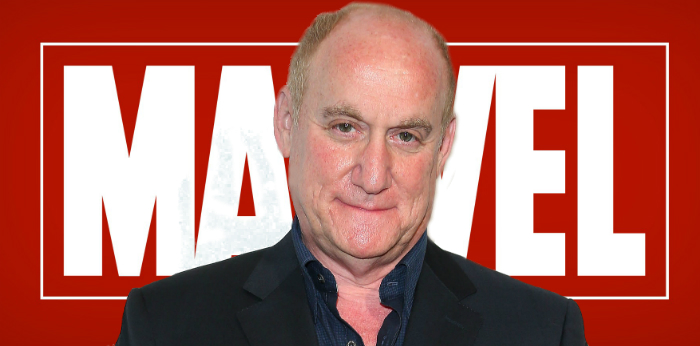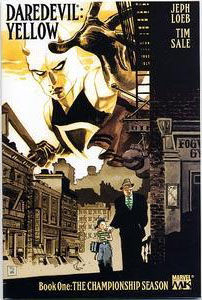
In the late eighties, a bizarre but intriguing mini-series about a bizarre but intriguing DC team hit the stands. That book, Challengers of the Unknown, seemed to be ignored by both readers and DC continuity cops (ah, Hypertime…), but marked the debut of writer-artist team of Jeph Loeb and Tim Sale, a team that now has fans waiting anxiously for each new project.
With Sale, Jeph Loeb breathed new life into the pasts of Batman, Superman, and most recently, Daredevil. (And fear not – they have another one coming up that will make you drool.) Working with other artists, Loeb has done stellar work on several of Marvel and DC’s best books, including, of course, the regular Superman monthly.
Like many who came after him, Loeb started out in Hollywood. The creator of the short-lived but fondly remembered Teen Wolf franchise, Loeb has occasionally returned to dabble in TV and film, where his profile may shoot sky-high in the next year.
With Buffy creator Joss Whedon, Loeb has begun work on Buffy: The Animated Series. Listed as co-developer, and executive producer, Loeb will literally be running the hotly-anticipated show. Let’s call him the show’s Grand Poobah and be done with it.
We first met Loeb at the San Diego Comic-Con this past summer, where he promised us an interview. Everybody’s schedules got terribly crunched, and it kept getting delayed. When we had time, Loeb didn’t, and when he had time, we didn’t. But somehow we got it together, and in the midst of a Holiday crunch, he graciously took the time to answer our questions.

Derek McCaw: How did you make the leap from Hollywood writer to comics?
Jeph Loeb: The quick version is that I’ve been fan since I was about 10 years old. Cut to: Years later and I was working on a live action feature film for The Flash and met (DC President and Publisher) Jenette Kahn. She asked if I would like to write a comic book for her and that, in turn, became my first work, Challengers of the Unknown. Short, but somewhat accurate.
DM:What do you find to be the biggest difference between working for the two mediums?
JL: Money. Not to be a smart ass about it, but features and television give you a tremendous amount of money to see your vision realized. Comics, however, on a tiny budget, give you the floor plans for a, hopefully, brilliant vision. They are cousins in many ways, certainly as we are seeing in the wave of comic book movies — but the superhero comic, in particular, is a unique and splendid American art form that should be appreciated for itself.
DM: Regarding Superman, was it your idea to bring back Krypto, and are there any other pre-Crisis characters you’d like to work back in to continuity?
JL: When I joined the Superman family, Superman Group Editor Eddie Berganza asked what — if any — would be our dream plans for working on Superman. I only had two: bringing back Krypto and Bizarro #1. Those have been SO rewarding, I couldn’t be happier. Everything else has just been stuffed animals and cotton candy.
DM: What motivated you to start using the speeches framing your issues of Superman, and did the device turn out the way you’d hoped?
JL: Well, I only did the speeches during Our Worlds At War. They would be all of 2 issues exactly — but because of the specials, JLA and World’s Finest, it seemed like more.

I knew I wanted something very unique that would resonate with what was going on in the images. I also knew it was a tremendous risk and as such, some folks were going to like it and some folks weren’t. Those speeches have withstood the test of time and there is a reason for that. Hopefully, some of our readers had never read them before and what a unique and wonderful way to be exposed to them. But, they were meant to be a score (as in music) acting as an undercurrent for the story. You could still appreciate what was happening by blipping over them — I personally, think you get less out of it — but then I wrote the darn thing too!
DM: Does it bother you that almost every character eulogized in your World’s Finest special has risen from the dead?
JL: How so? Aquaman is gone; Atlantis is gone; Hippolyta is gone; Maxima and Massacre are gone; Strange Visitor is gone; and Sam Lane is gone. The Young Justice portion of the story was to show there is HOPE even during wartime and the tragedy of what happened to Impulse still resonates in that character. I guess you’re reading a different set of comics than I am…
DM: I stand corrected in trying to be glib and edgy. I was thinking in terms of the big guys, since Aquaman did originally seem to be dead and will surely return, and Steel and Sgt. Rock have revived. But now I’m just embarrassed. Moving on…do you think that President Luthor will serve a full term? Why would or wouldn’t you want that to happen?
JL: Why not? He’s doing a heck of a good job. And that should worry you. Very much.
DM: Do you change your writing style to match the artists that you’re working with? How does writing for Tim Sale, for example, differ from writing for Ed McGuinness? And did your style change when McGuinness came aboard Superman?
JL: I try. I would like to think I do. I believe in working toward an artist’s strengths. Sometimes I’m successful and sometimes, I’m not. But it won’t be for lack of trying. Tim draws very detailed, very emotional faces that are almost unique in comics; MC2 gives you power and size, which is equally unique.
I think of Tim’s work as a carefully threaded bow and arrow and McGuinness’ as an atomic bomb. They both are wonderful in their own way!
DM: You and Sale have gotten justifiable acclaim, most recently with Daredevil: Yellow. What process do you go through to try and get to the heart of a character, as you’ve done so well with Superman, Batman, and Daredevil?
JL: It begins with character. The joy of doing a short closed ended story is that Tim and I can focus on a particular period of a character’s life and really work on that. Grief, for example, which drives much of DD:Y, is a passing thing.

If we were working on a monthly comic, folks would be screaming for our heads — but knowing it is close ended, they are more patient (theoretically) than the other monthly folks. Superman (in the monthly comic), for example, is going through some tough times now post-War and there are some folks who get it and are riding it out with him and others are just screaming for him to be the tough as nails, shove around the universe Silver Age kind of guy. We’ll get there. Sometimes you need to lose something to appreciate what you’ve lost.
DM: Who’s left that you’d like to tackle?
JL: Spidey. He’s up next. It looks to be a lot of fun. Very different from anything else — certainly that Tim and I have done.
DM: Do you have any original characters that you’d like to give a book?
JL: I have given them. Going back to Cable and through Superman, there are lots of original characters from Blaquesmith to X-Man, to Imperiex, Brainiac 13 and Ignition.
But if you’re asking if I would like to break anyone out — that’s more of a question for the company. They usually ask when something works. There’s a twist on Superman #180, March 2002, where Superman meets Dracula that ends on a note that I think could spring board off if we had the right artist.
Many times it boils down to, yeah, that would be cool… but who’s gonna draw it?!
DM: What can you tell us about Buffy: The Animated Series?
JL: It’s a wonderful experience. We have the best writing staff in the animated business because — ta-da — we have the Buffy (live action) writing staff.

We’re going after and have gotten promises from nearly all of the original cast members to do the voices (yay, Willow!). And shortly, we will be announcing the animation team which blow folks’ socks off. The designs, which are kept under closely guarded secret, are simply delightful. It’s going to be a great show.
DM: How has it been to work on Joss Whedon’s baby?
JL: The best experience I’ve had working in Hollywood. Joss has no reason to be as involved, as generous, and as brilliant — other than that that’s who he is. It was/is an amazing surprise given the amount of time and energy he has to put elsewhere that he is as involved as he is and I’ve been loving it. Gush. Gush. Gush.
DM: What advice would you give to someone trying to break into either comics or film as a writer?
JL: Keep at it. Don’t let anyone discourage you. Write every day — at least one page. Then, at the end of a year, you’ll have written — 365 pages and you will be a better writer.
Be patient. If it were easy, everyone would be doing it. But, like anything, you do get better with practice and sometimes practice is working on anything. Look, Challengers of The Unknown wasn’t my first, fifth or even last choice for my first comic book work. I didn’t even know the characters when I got the assignment. But, look what it has led to. There are no bad assignments, just things that are done badly (my own work included!).

